更好的英语表达
特殊比较级和最高级的单词

特殊比较级和最高级的单词 1. Good (好)。
比较级,better (更好的)。
最高级,best (最好的)。
2. Bad (坏)。
比较级,worse (更糟的)。
最高级,worst (最糟的)。
3. Little (少)。
比较级,less (更少的)。
最高级,least (最少的)。
4. Much (多)。
比较级,more (更多的)。
最高级,most (最多的)。
5. Far (远)。
比较级,farther/further (更远的)。
最高级,farthest/furthest (最远的)。
6. Late (迟)。
比较级,later (更迟的)。
最高级,latest (最迟的)。
7. High (高)。
比较级,higher (更高的)。
最高级,highest (最高的)。
8. Low (低)。
比较级,lower (更低的)。
最高级,lowest (最低的)。
9. Big (大)。
比较级,bigger (更大的)。
最高级,biggest (最大的)。
10. Small (小)。
比较级,smaller (更小的)。
最高级,smallest (最小的)。
这些是常见的特殊比较级和最高级的单词,但并不是全部。
值得注意的是,有些单词的比较级和最高级形式是通过在词前加上more和most来构成的,例如,more beautiful (更美的)、mostbeautiful (最美的)。
此外,还有一些特殊的比较级和最高级形式需要通过变化词尾或使用不规则形式来构成。
英语句子高级表达方式

英语句⼦⾼级表达⽅式1. 英语中最⾼级的表达法最⾼级表⽰三者或三者以上的⼈或物进⾏⽐较时,⽤最⾼级。
形容词的最⾼级前⾯要加定冠词the,副词最⾼级前⾯的the可以省略。
在含有最⾼级的句⼦中,常有⼀个in/of短语来表⽰⽐较范围。
⼀般情况下,直接给词尾加-est,例如,tall-tallest:以辅⾳字母加Y结尾的变y为i加-est,例如happy-happiest.以e结尾的,直接加-st:少数以-y, -er, -ow, -ble结尾的双⾳节最⾼级是在词尾加 -est 构成。
clever(原级) cleverest(最⾼级)以⼀个辅⾳字母结尾其前⾯的元⾳字母发短元⾳的形容词的最⾼级是双写该辅⾳字母然后再加 -er和-est。
big (原级) biggest (最⾼级)表⽰好、坏、多、少、远、年长⼏个特殊词汇good / well ---better---bestill /bad/badly--- worse---worstmany / much ---more---mostlittle ---lest ---leastfar有两种1.距离上的远和更远 far---farther---farthest2.程度 far---further---furthestold有两种1.⽐……⼤ old---older---oldest2.作定语修饰其他名词 old---elder---eldest 如elder sister【注】形容词前如加 less 和 lest 则表⽰"较不"和"最不"important 重要less important 更不重要the least important 最不重要2. 英语中最⾼级的表达法构成法原级⽐较级最⾼级⼀般单⾳节词 tall(⾼的) taller tallest 未尾加-er,-est great(巨⼤的) greater greatest 以不发⾳的e结尾 nice(好的) nicer nicest 的单⾳词和少数 large(⼤的) larger largest 以- le结尾的双 able(有能⼒的) abler ablest ⾳节词只加-r,-st 以⼀个辅⾳字母 big(⼤的) bigger biggest 结尾的闭⾳节单 hot热的) hotter hottest ⾳节词,双写结尾的辅⾳字母,再加-er,-est "以辅⾳字母+y" easy(容易的) easier easiest 结尾的双⾳节词,busy(忙的) busier busiest 改y为i,再加 -er,-est 少数以-er,-ow clever(聪明的) cleverer cleverest 结尾的双⾳节词 narrow(窄的) narrower narrowest 未尾加-er,-est 其他双⾳节词和 important(重要的)多⾳节词,在前 more important ⾯加more,most most important 来构成⽐较级和 easily(容易地)最⾼级。
学生英语评语集锦

学生英语评语集锦学生英语评语集锦加油!—comeon!很棒!—Great!很好!—Verygood!优秀!—Excellent!学习无坦途。
—Thereisnoroyalroadtolearning.光阴一去不复返。
—Losetimeisneverfoundagain.学习从不嫌晚。
—It’snevertoolatetolearn.熟能生巧。
—Practicemakesperfect.不劳无获。
—Nopains,nogains.昨日不再来。
—Noonecancallbackyesterday.放弃就是失败。
—Togiveupistofail.百说不如一干。
—Actionsspeaklouderthanwords.有志者事竟成。
—wherethereisawillthereisaway.一知半解很危险。
—Alittlelearningisadangerousthing.苦尽甘来最是甜。
—Sweetispleasureafterpain.学问无涯,人生有限。
—Artislong,butlifeisshort.不提问的人,是什么也学不到的。
—Hethatnothingquestions,nothinglearning.英语作业批语拾汇1、Good!Verygood!wonderful!Excellent!2、Iampleasedthatyouhavemadesogreat!很高兴看见你现在取得这么大的进步。
谢谢你!3、welldone!Trytobebetternexttime,willyou?真棒!争取下次更好,行吗?4、whatabeautifulwriting!Ifonlybemorecareful!多漂亮的书写呀!要是作业再仔细一点就好了!5、welldone!Butwouldyoupleaseimproveyourwriting?做得很好!再设法改善一下你的书写怎么样?6、I’msogladtoseeyourgreatprogressinyourexercises.你的作业进步这么大,我真高兴!7、Tryagain,I’msureyouwilldobetternexttime!再努一把力!相信你下次会做得更好!8、“Ifonly…!”,“HowIwish…!”,“wouldyouplease…?”,“I’mafraidyou…”9、wouldyoupleasepayattentionto…?请你注意……好吗?10、Iamsorrytoseeyoudidnotuseyourownhead?我很遗憾,你这次作业没有使用自己的脑袋。
常用英语短语和惯用表达方式

常用英语短语和惯用表达方式英语作为一门世界性语言,在日常生活中会使用到很多的短语和惯用表达方式。
这些短语和表达方式不仅仅是在交流中起到了一定的便利作用,同时也可以让我们更好地理解英语中的文化内涵和常见表达方式。
本文将从日常生活和商务场景中介绍一些常用的英语短语和惯用表达方式。
日常生活场景:1. How are you? / How are you doing? / How's it going? - 问候或者询问对方近况这些都是日常交流中问候的常用表达方式,其中How are you?最为常见,也是最礼貌的一种问候方式。
2. What's up? - 询问对方有何事情需要和自己分享这是较为随意的一种问候方式,常用于和朋友、同事之间之间简单交流。
3. I'm sorry. / Excuse me. - 表示道歉或者请求别人让路。
这两个短语都是日常生活中使用频率较高的表达方式。
前者可以表示对自己的错误的道歉,后者则常常用于请求别人让路。
4. Thanks. / Thank you. / Thanks a lot. - 表示感谢别人的帮助或者关心。
这些短语都可以表示对别人的感激之情,使用时应注意根据情景选择使用相应的短语以表达个人感受。
5. Have a good day. / Goodbye. - 告别语。
这些短语都是告别时可以使用的表达方式,语气较为和谐。
商务场景:1. How may I help you? / Can I assist you? - 询问对方是否需要帮助。
当你在商务场景中办理业务时,工作人员常常会问你是否需要帮助,这时你可以使用这两种短语回答。
2. Nice to meet you. / Pleasure to meet you. - 简单的问候方式。
这些短语常常用于商务谈判或者面试时的问候,主要是为了拉近彼此之间的距离。
3. Could you please repeat that? / Could you speak slower, please? - 请求对方重复或者放慢语速。
“非常,极其,很”的26种英文表达法
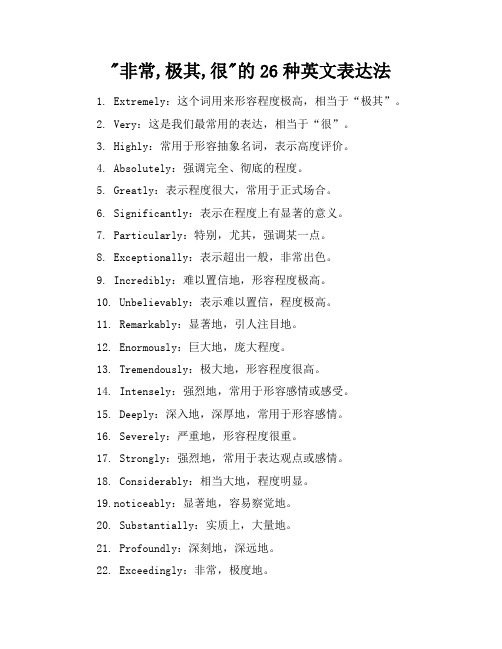
"非常,极其,很"的26种英文表达法1. Extremely:这个词用来形容程度极高,相当于“极其”。
2. Very:这是我们最常用的表达,相当于“很”。
3. Highly:常用于形容抽象名词,表示高度评价。
4. Absolutely:强调完全、彻底的程度。
5. Greatly:表示程度很大,常用于正式场合。
6. Significantly:表示在程度上有显著的意义。
7. Particularly:特别,尤其,强调某一点。
8. Exceptionally:表示超出一般,非常出色。
9. Incredibly:难以置信地,形容程度极高。
10. Unbelievably:表示难以置信,程度极高。
11. Remarkably:显著地,引人注目地。
12. Enormously:巨大地,庞大程度。
13. Tremendously:极大地,形容程度很高。
14. Intensely:强烈地,常用于形容感情或感受。
15. Deeply:深入地,深厚地,常用于形容感情。
16. Severely:严重地,形容程度很重。
17. Strongly:强烈地,常用于表达观点或感情。
18. Considerably:相当大地,程度明显。
19.noticeably:显著地,容易察觉地。
20. Substantially:实质上,大量地。
21. Profoundly:深刻地,深远地。
22. Exceedingly:非常,极度地。
23. Hugely:巨大地,庞大程度。
24. Mightily:强大地,形容力量或影响很大。
25. Utterly:完全地,彻底地。
26. Fully:完全地,充足地。
当然,让我们继续探索更多表达“非常,极其,很”的英文方式,为你的词汇库增添色彩。
27.Extremly:这个词虽然与"Extremely"拼写相似,但它在口语中更常见,用来强调极端的程度。
28. Awfully:虽然"awful"通常有负面含义,但在口语中"awfully"可以用来轻微地强调。
英语翻译方法有哪些

英语翻译方法有哪些英语翻译方法有哪些?翻译是将一种语言的表达转化为另一种语言的过程。
英语翻译常常存在着一些挑战,如词汇和语法的差异以及文化差异。
然而,有一些常用的翻译方法可以帮助人们更好地进行英语翻译。
以下是一些常用的英语翻译方法。
1. 直译法(Literal Translation):直译法是最直接和简单的翻译方法,直接将源语言的词和短语逐字逐句地翻译成目标语言。
这种方法保持了原文的句法结构和单词的字面意义。
然而,直译法可能会导致一些翻译不准确或生硬的表达。
2. 意译法(Free Translation):意译法是根据源语言的意思,用目标语言的实际用词和习惯表达来进行翻译。
这种方法有时会改变句子的结构和顺序,使翻译更符合目标语言的习惯表达。
然而,意译法可能会带来一些信息的失真或误解。
3. 文化对比法(Cultural Comparison):文化对比法是将源语言的文化背景和习惯用法与目标语言进行比较,以更好地理解并翻译源语言的内容。
这种方法有助于解决源语言和目标语言之间的文化差异,并更好地传达原文的意思。
然而,文化对比法需要对两种语言和文化有深入的了解。
4. 转换法(Transposition):转换法是通过改变词语的词性或位置来进行翻译。
这种方法可以帮助处理源语言和目标语言之间的语法差异,并更好地保持句子的连贯性和流畅性。
然而,转换法需要考虑到词语的意义和语法结构的变化。
5. 合成法(Compensation):合成法是在翻译过程中,通过在其他部分进行补偿来传达源语言的意思。
这种方法适用于源语言中可能没有对应的目标语言词语或短语的情况。
然而,合成法需要确保不会改变原文的意思并保持翻译的准确性。
6. 去文化化法(Deculturalization):去文化化法是将源语言文化的特定表达转化为目标语言中更普遍和通用的表达。
这种方法可以帮助翻译更好地融入目标语言社会,并避免因文化差异而引起的误解或困惑。
跟老外聊天的英语口语

跟老外聊天的英语口语当你和老外聊天时,英语口语是非常重要的沟通工具。
以下是一些常用的英语口语表达,可以帮助你更好地与老外交流:1. Hello! / Hi! 你好!2. How are you? 你还好吗?3. How's everything going? 一切都好吗?4. What's new? 有什么新鲜事吗?5. What have you been up to? 你最近在忙什么?6. Nice to meet you. 很高兴认识你。
7. Nice to see you again. 很高兴再次见到你。
8. How's life been treating you? 生活对你还好吗?9. What do you think of [topic]? 你觉得[话题]怎么样?10. What do you like to do in your free time? 你空闲的时候喜欢做什么?11. What's your favorite food? 你最喜欢的食物是什么?12. Where are you from? 你来自哪里?13. What's your favorite place in [location]? 在[地点]你最喜欢的地方是哪里?14. When are you planning on leaving? 你打算什么时候离开?15. See you later! 再见!16. Take care! 保重!17. You're looking great! 你看起来棒极了!18. I'm doing well. 我很好。
19. How about you? 你呢?20. I can't complain. 我没有什么可抱怨的。
21. What do you think of this weather? 你觉得今天的天气怎么样?22. It's a nice day, isn't it? 今天天气真好,不是吗?23. Let's hope for the best. 让我们抱最好的希望。
第一第二第三英语高级表达方式
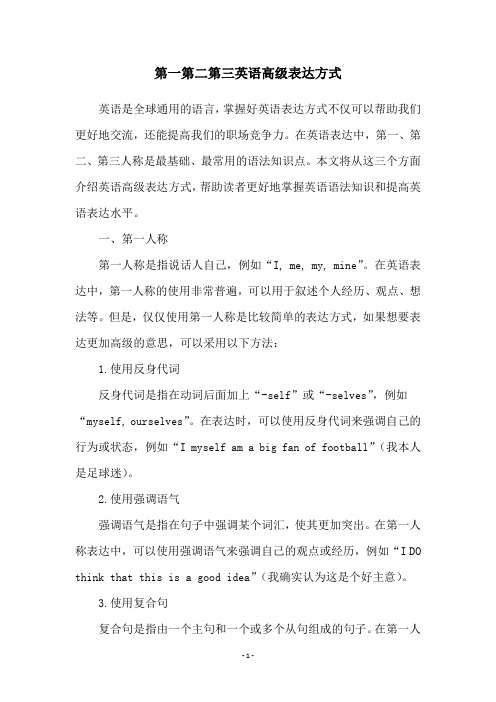
第一第二第三英语高级表达方式英语是全球通用的语言,掌握好英语表达方式不仅可以帮助我们更好地交流,还能提高我们的职场竞争力。
在英语表达中,第一、第二、第三人称是最基础、最常用的语法知识点。
本文将从这三个方面介绍英语高级表达方式,帮助读者更好地掌握英语语法知识和提高英语表达水平。
一、第一人称第一人称是指说话人自己,例如“I, me, my, mine”。
在英语表达中,第一人称的使用非常普遍,可以用于叙述个人经历、观点、想法等。
但是,仅仅使用第一人称是比较简单的表达方式,如果想要表达更加高级的意思,可以采用以下方法:1.使用反身代词反身代词是指在动词后面加上“-self”或“-selves”,例如“myself, ourselves”。
在表达时,可以使用反身代词来强调自己的行为或状态,例如“I myself am a big fan of football”(我本人是足球迷)。
2.使用强调语气强调语气是指在句子中强调某个词汇,使其更加突出。
在第一人称表达中,可以使用强调语气来强调自己的观点或经历,例如“I DO think that this is a good idea”(我确实认为这是个好主意)。
3.使用复合句复合句是指由一个主句和一个或多个从句组成的句子。
在第一人称表达中,可以使用复合句来更加复杂地表达自己的意思,例如“Although I am not a professional chef, I love cooking and I have learned a lot from my mother”(虽然我不是专业厨师,但我爱做饭,我从我妈妈那里学到了很多)。
二、第二人称第二人称是指与说话人交流的对象,例如“you, your, yourself”。
在英语表达中,第二人称的使用也非常普遍,可以用于询问对方的观点、表达自己的意见、建议等。
但是,仅仅使用第二人称也是比较简单的表达方式,如果想要表达更加高级的意思,可以采用以下方法: 1.使用名字或称谓在与对方交流时,可以使用对方的名字或称谓来表达尊重或亲切感,例如“John, what do you think about this?”(John,你觉得这个怎么样?)或“Doctor, could you give me some advice?”(医生,你能给我一些建议吗?)。
1-选择更好的英语表达-Long word replacements采用更简易的表达

Long word replacementsInstead of ... Change to or try ...采用以下更简易的表达access (as a verb) get, reachaccommodate fit, hold, adapt, house, adjust, help, grant, allowaccommodation,home, house, room, homes, houses, rooms accommodationsaccompany,go with, escort, with, attend, belong to accompanyingaccomplish do, achieve, perform, succeed, carry outaccordingly soacquire get, buy, win, gain, earn, pick upadditionally and, also(an) additional more, added, other, extra, anotheradequate (number of)enough, satisfactory, acceptableadjust, adjustment changeadvise tell, recommendafford givealter, alteration changealternative otherameliorate make better, improveanalogous similaranticipate expectappend attach, addapprise tell, adviseappropriate (as anproper, right, fitting, suitable, apt, correct adjective)(for) approximately about, roughly, almost, around, close to, nearly, or soascertain check, be sure, find out, discover, learnassist; assistance help, aid, back, relieve; help, aid, backing, support, relief attain reach, succeed, meet, gain, get, win, arrive at, grasp attempt (as a verb) try, take onattired dressed, dressed, clothedaugment increase, make largerbasically Delete or use mainly, most, mostly, chiefly, largely biannually twice a yearbimonthly ,biweekly every two months, every other month; every two weeks, every other weekcategory groupcease end, stop, finishcognizant aware, knowingcommence begin, start, opencommencement beginning, startcommunicate write, talkcompensation pay, paymentcomplete finishcomponent, components part, parts, ingredient, item, unitcomprise consist of, containconceal hide, cloak, cover, disguise, mask, shelter, veil concept ideaconcerning about, on, for, as for, in, of, over, to, toward, with consequence result, effect, outcome, importance, note, weight consequently so, thusconsolidate combine, joinconstitute make up, be, compose, form, set up, frameconstruct build, make, erect, set up, compose, form, frame, model container bottle, jar, packagecooperate helpcurrently now, today, (just) yet or deletecustomary usual, ordinary, normal, routine, regulardeem consider, think, treat as, believe, judge, viewdelete cut, dropdemise deathdemonstrate show, prove, display, explain, teach, marchdenote show, say, mark, note, mean, stand fordepart leave, godesignate appoint, set, name, label, choose, earmark, show desire need, want, wishdesist stop, suspend, end, give updetain holddetermine figure out, learn, find out, fit, decide, settle, end, control, fix, discoverdiminutive small, tiny, littledisseminate send out, spread, scatterdonate give, grant, presentduplicate (as a verb) copy, double, repeal, multiplyeffectuate carry out, bring about, achieve, realize, cause e.g. (exempli gratia) for exampleeliminate cut, drop, end, get rid of, remove, erase, expel, cancel, cut outemploy (an instrument or usetool)encounter (as a verb) meet, run into, faceendeavor (as a verb) try, carry outenumerate list, name, count, numberet al. (et alibi, et alii) and others, and elsewhereetc. (et cetera) and others, and the like, and the restevince show, revealexpedite hasten, speed up, hurryexpend spend, use, payexpenditure expense, cost, spending, outlay, charge, payment expiration end, close, finish, deathfacilitate help, ease, make easy, make easier, simplify, promotefacility base, building, factory, laboratory, office, plant, warehouse (be specific or omit)factor part, fact, feature, condition, circumstances, reason, cause (be specific or omit)feasible possible, probable, likely feedback comments, response, opinions finalize finish, end, complete, settle, wrap up following (as apreposition)afterformulate devise, develop, form, make, work out, draw up, draft, frame, create, express, planforward (as a verb) sendfundamental basicfurnish give, send, provide, supply, equip hence so, from now, from here henceforth from now on, from nowhereafter; herein, herewith; heretofore from now on or later for hereafter; here is (are), with this or in this for herein and herewith; up to now, earlier, before or until now for heretoforehosted gave, is host to, entertained i.e. (id est) that isimpact (as a verb) affect, influenceimplement carry out, achieve, do, follow, fulfill, make, produce, put in place, put into use, realize, set, set up, complete, impose (as a verb); tool, instrument (as a noun)inception beginning, start, birth incombustible fireproofindicate say, show, suggest, feel, hint, mention, point at, tell, mark, signal, point out, point to, readindication sign, signal, mark, hint, suggestionindividual, individuals person, people, man, men, woman, women, anyone, everyone, someoneinform tellinitiate begin, introduce, open, start, cause, launch, set up, introduce, admitinput, output, throughput information; input: advice, clout, comments, effort, ideas, opinions, thoughts, views; output: work, product, byproduct, result; throughput: materialinquire (about)askinstitute (as a verb) begin, start, set up, introduce, create, found interface interact, meet, collaborate, work together, link,contactlocality, location area, city, district, locale, place, point, site, spot, town, zone, neighborhoodmagnitude size, extent, importance, greatnessmanner waymaterialize appear, develop, happen, occur, turn up, come aboutmaximum most, largest, greatestmethodology methods, principles, procedureminuscule tinymitigate moderate, ease, soften, relieve, reducemodify, modifications change, vary, adapt, adjust; changes, variations, adjustments monies, moneys funds, money, cashmoreover besides, alsonecessitate require, demand, exact, must, need, force, compel, make, call, call fornecessity neednevertheless anyhow, but, even so, however, still, yet notification notice, warning, advice, announcementdespite, although, even if, howevernumerous many, countless, endless, several, untold (or be more specific)objective aim, goalobligated bound, compelledobligation debt, duty, bond, contract, tie, favorobserve see, watch, note, view, follow, keep, obey, remark obtain get, earn, gain, buy, exist, hold, standobviate avoidongoing continuing, under way, active, constant, advancing, current, growing, endless, lastingoperate use, work, run, perform, act, go, handle, manage, cause, keep operational active, live, running, workingoptimal, optimum best, ideal, model, greatest, most, peakorientate orientoverall total, complete, general paradigm pattern, example, modelparameter limit, boundary, guideline, extent, perimeter--or properties, conditions, characteristics, featurepermit let, allowperuse read with care, review, study, examine, inspectplace (as a verb) putportion partpossess have, own, control, hold, take, take overpossibility chancepreplan, preplanning plan, planningpresent (as a verb) give, introduce, showpresently in a little while, in a short time, shortly, soonpreserve keeppreventative preventiveprevious earlierpreviously before, earlierprincipal main, chiefprior earlierprioritize arrange, list, order, rank, rate, set prioritiesproceed go, go ahead, continue, go on, move, run, walk, advance procure get, buy, gain, win, findprovide (with)givepurchase (as a verb) buyreceive accept, getregard, regarding about, on, for, as for, in, of, over, to, toward, with relate (to)say, show, tellremain stayremainder rest, remains, excess, surplus, balanceremove take away, haul awayremunerate payrender make, give, deliver, hand over, present, send in, pay, show reoccur recurrepresents isreproduce copyrequest (as a verb) ask, seek, questionreside live, stay, remainresidences homes, houses, addressesretain keep, hold, savesecure getselect choose, picksemiannually twice a yearshall will, mustsolely onlystate saystrategize plansubsequently later, afterward, then, after, next, sincesubsequent (to)later, after, afterward, next, since, then, following, resulting substantiate back up, confirm, prove, support, verifysummon send for, call, call up, call onsupplement add toterminate end, stop, cancel, finish, fire, halt, close, wind up, limit therefore so, then, thusthus sotransmit send, broadcast, relay, transfer, pass on, bear, carry transpire happen, occur, take place, leak outultimate last, final, crowning, perfect, supreme, eventual upon onutilize useuse up usevirtually almostvis-a-vis about, compared with, oppositewhether if。
怎么说话情感表达好呢英语
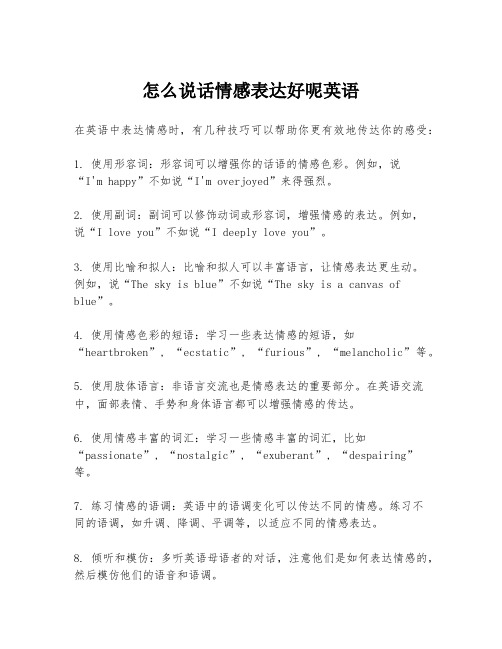
怎么说话情感表达好呢英语在英语中表达情感时,有几种技巧可以帮助你更有效地传达你的感受:1. 使用形容词:形容词可以增强你的话语的情感色彩。
例如,说“I'm happy”不如说“I'm overjoyed”来得强烈。
2. 使用副词:副词可以修饰动词或形容词,增强情感的表达。
例如,说“I love you”不如说“I deeply love you”。
3. 使用比喻和拟人:比喻和拟人可以丰富语言,让情感表达更生动。
例如,说“The sky is blue”不如说“The sky is a canvas of blue”。
4. 使用情感色彩的短语:学习一些表达情感的短语,如“heartbroken”, “ecstatic”, “furious”, “melancholic”等。
5. 使用肢体语言:非语言交流也是情感表达的重要部分。
在英语交流中,面部表情、手势和身体语言都可以增强情感的传达。
6. 使用情感丰富的词汇:学习一些情感丰富的词汇,比如“passionate”, “nostalgic”, “exuberant”, “despairing”等。
7. 练习情感的语调:英语中的语调变化可以传达不同的情感。
练习不同的语调,如升调、降调、平调等,以适应不同的情感表达。
8. 倾听和模仿:多听英语母语者的对话,注意他们是如何表达情感的,然后模仿他们的语音和语调。
9. 使用情感相关的习语:习语可以增加语言的丰富性和地道性。
比如,“to have a heart of gold”表示心地善良。
10. 练习写作:通过写作练习情感表达,比如写日记或情感丰富的信件,可以帮助你更好地组织和表达情感。
记住,情感表达不仅仅是词汇的选择,还包括语调、语速、节奏和肢体语言的综合运用。
通过不断实践和学习,你将能够更自然和有效地用英语表达情感。
初三英语形容词短语搭配单选题30题
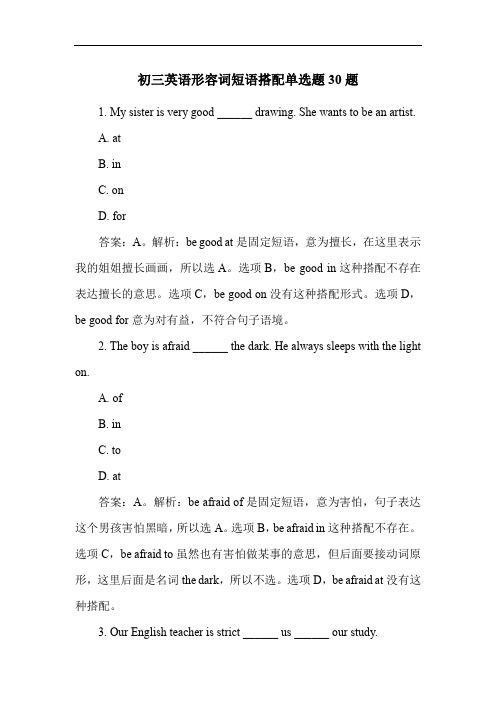
初三英语形容词短语搭配单选题30题1. My sister is very good ______ drawing. She wants to be an artist.A. atB. inC. onD. for答案:A。
解析:be good at是固定短语,意为擅长,在这里表示我的姐姐擅长画画,所以选A。
选项B,be good in这种搭配不存在表达擅长的意思。
选项C,be good on没有这种搭配形式。
选项D,be good for意为对有益,不符合句子语境。
2. The boy is afraid ______ the dark. He always sleeps with the light on.A. ofB. inC. toD. at答案:A。
解析:be afraid of是固定短语,意为害怕,句子表达这个男孩害怕黑暗,所以选A。
选项B,be afraid in这种搭配不存在。
选项C,be afraid to虽然也有害怕做某事的意思,但后面要接动词原形,这里后面是名词the dark,所以不选。
选项D,be afraid at没有这种搭配。
3. Our English teacher is strict ______ us ______ our study.A. with inB. in withC. to forD. for to答案:A。
解析:be strict with sb. in sth.是固定搭配,意为在某方面对某人严格,这里表示英语老师在学习方面对我们严格,所以选A。
选项B顺序错误。
选项C和D中的to和for没有这种搭配用法。
4. This movie is very popular ______ young people.A. withB. forC. toD. among答案:A。
解析:be popular with是固定短语,意为受某人欢迎,这里表示这部电影很受年轻人欢迎,所以选A。
had、should、were提前的用法

《had、should、were提前的用法》1. 引言在英语语法中,动词的提前使用是一种常见的用法。
在本文中,将重点探讨had、should和were这三个动词在句子中提前使用的情况,分别从它们的基本含义、用法和语境进行全面评估,以帮助读者更深入地理解这些动词的用法及其在句子中的特殊表达方式。
2. had的提前用法在英语语法中,had可以在句子中提前使用,例如:“Had I known the truth, I would have acted differently.” 这种用法通常用于虚拟语气或倒装句中,表示对过去某事的假设或猜测。
在这种情况下,had 的提前用法能够突出强调对过去事件的假设,使句子更加生动。
3. should的提前用法should也可以在句子中提前使用,例如:“Should you need any assistance, please do not hesitate to contact us.” 这种用法常用于表达礼貌、建议或假设,对应的汉语表达为“万一/如果/要是……的话”。
通过should的提前使用,句子更显得客气和委婉,同时也能够引起对假设情况的注意。
4. were的提前用法在表达虚拟语气或条件句时,were也常常可以在句子中提前使用,例如:“Were I to win the lottery, I would travel around the world.” 这种用法也是一种倒装句,能够更加突出句子中的虚拟假设,使句子更富有表现力。
5. 总结与回顾通过以上对had、should和were这三个动词提前用法的深入探讨,我们可以发现它们在句子中的提前使用往往能够起到突出强调、礼貌委婉或虚拟假设的作用。
这种特殊的表达方式在英语写作中极具表现力和变化性,值得我们在学习和应用中加以重视。
6. 个人观点在我的看法中,掌握好动词的提前用法对于提高英语写作水平和表达能力非常重要。
想要更好的自己的英语作文

As a high school student, the journey to improve my English writing has been both challenging and rewarding. It all started with a realization that my English skills needed a significant boost to keep up with the academic demands and to communicate effectively with the global community.Initially, my English writing was quite basic, filled with grammatical errors and a lack of vocabulary. I would often struggle to express my thoughts coherently on paper. This was a wakeup call for me to take my language skills seriously. I knew that to become better, I needed to immerse myself in the language and practice consistently.The first step in my journey was to expand my vocabulary. I began reading English novels, newspapers, and magazines. I would underline unfamiliar words and look up their meanings. Over time, I started to notice patterns in word usage and began to incorporate these new words into my writing. This not only improved my vocabulary but also helped me understand the nuances of the language.Next, I tackled grammar. I enrolled in an online course that focused on English grammar. It was a rigorous process, but I was determined to master it. I practiced grammar exercises daily and sought feedback from my teachers and peers. Gradually, my sentences became more structured, and my writing started to flow more naturally.To further enhance my writing skills, I started writing a daily journal in English. This allowed me to practice expressing my thoughts and ideas in amore organized manner. I also began to write essays on various topics, which helped me develop my argumentative and analytical skills. I would often revise my drafts multiple times, refining my language and ensuring that my arguments were clear and logical.Moreover, I sought opportunities to engage in conversations with native English speakers. This was a crucial step in understanding the natural flow of the language and improving my listening and speaking skills. I joined English clubs and participated in language exchange programs, which exposed me to different accents and dialects. These interactions not only boosted my confidence but also provided me with a deeper understanding of the cultural context behind the language.In addition, I made use of technology to aid my learning. I used language learning apps and online resources to practice my writing and receive instant feedback. I also utilized online forums to discuss various topics and engage in debates, which helped me refine my writing style and think critically.One of the most significant turning points in my journey was when I started participating in English writing competitions. These competitions not only pushed me to think creatively but also provided me with an opportunity to receive constructive criticism from experts. The feedback I received was invaluable in identifying my strengths and areas for improvement.Over time, my dedication and consistent efforts began to pay off. Mywriting improved significantly, and I started to receive positive feedback from my teachers and peers. I felt a sense of accomplishment and pride in my progress, which motivated me to continue striving for excellence.The journey to improve my English writing has been a transformative experience for me. It has not only enhanced my language skills but also broadened my horizons and opened up new opportunities. I have learned the importance of perseverance, selfdiscipline, and continuous learning in the pursuit of selfimprovement.In conclusion, becoming a better English writer is a continuous process that requires dedication, practice, and a willingness to learn from mistakes. It involves expanding ones vocabulary, mastering grammar, practicing writing regularly, engaging in conversations, utilizing technology, seeking feedback, and participating in competitions. By embracing this journey, one can unlock new possibilities and achieve personal growth.。
为人着想的英语
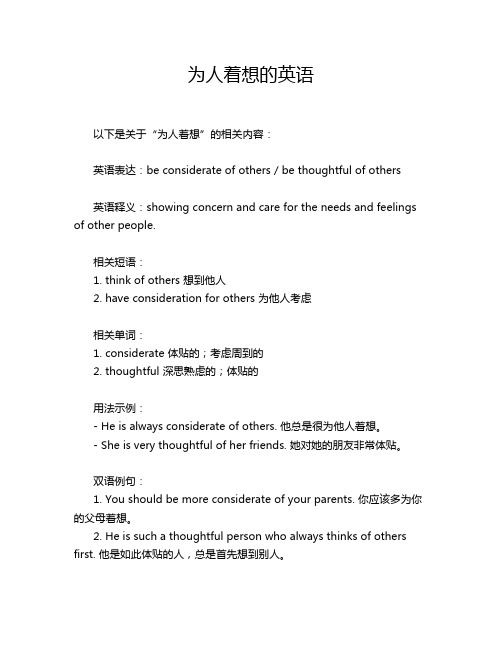
为人着想的英语以下是关于“为人着想”的相关内容:英语表达:be considerate of others / be thoughtful of others英语释义:showing concern and care for the needs and feelings of other people.相关短语:1. think of others 想到他人2. have consideration for others 为他人考虑相关单词:1. considerate 体贴的;考虑周到的2. thoughtful 深思熟虑的;体贴的用法示例:- He is always considerate of others. 他总是很为他人着想。
- She is very thoughtful of her friends. 她对她的朋友非常体贴。
双语例句:1. You should be more considerate of your parents. 你应该多为你的父母着想。
2. He is such a thoughtful person who always thinks of others first. 他是如此体贴的人,总是首先想到别人。
3. She has consideration for others and never does anything to hurt them. 她为他人考虑,从不会做任何伤害他们的事。
4. We need to be more considerate of the feelings of those around us. 我们需要更体贴周围人的感受。
5. A good friend is always considerate of your situation. 一个好朋友总是会为你的处境着想。
6. They are very thoughtful of the elderly in themunity. 他们对社区里的老年人非常体贴。
喜怒哀乐的英语高级表达
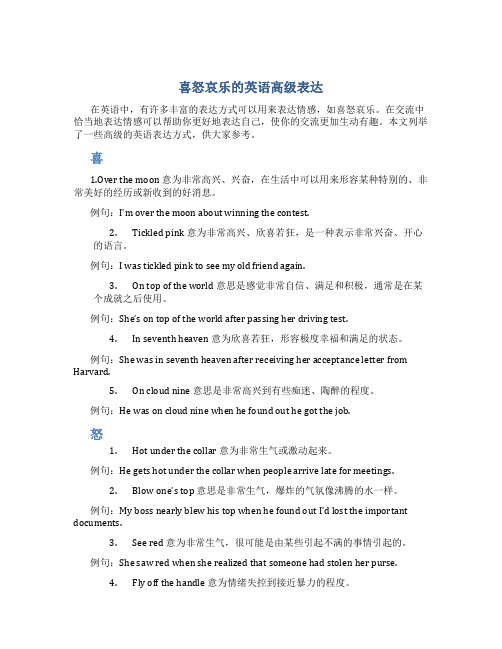
喜怒哀乐的英语高级表达在英语中,有许多丰富的表达方式可以用来表达情感,如喜怒哀乐。
在交流中恰当地表达情感可以帮助你更好地表达自己,使你的交流更加生动有趣。
本文列举了一些高级的英语表达方式,供大家参考。
喜1.Over the moon 意为非常高兴、兴奋,在生活中可以用来形容某种特别的、非常美好的经历或新收到的好消息。
例句:I’m over the moon about winning the contest.2.Tickled pink 意为非常高兴、欣喜若狂,是一种表示非常兴奋、开心的语言。
例句:I was tickled pink to see my old friend again.3.On top of the world 意思是感觉非常自信、满足和积极,通常是在某个成就之后使用。
例句:She’s on top of the world after passing her driving test.4.In seventh heaven 意为欣喜若狂,形容极度幸福和满足的状态。
例句:She was in seventh heaven after receiving her acceptance letter from Harvard.5.On cloud nine 意思是非常高兴到有些痴迷、陶醉的程度。
例句:He was on cloud nine when he found out he got the job.怒1.Hot under the collar 意为非常生气或激动起来。
例句:He gets hot under the collar when people arrive late for meetings.2.Blow one’s top 意思是非常生气,爆炸的气氛像沸腾的水一样。
例句:My boss nearly blew his top when he found out I’d lost the important documents.3.See red 意为非常生气,很可能是由某些引起不满的事情引起的。
好久不见的高级表达英语
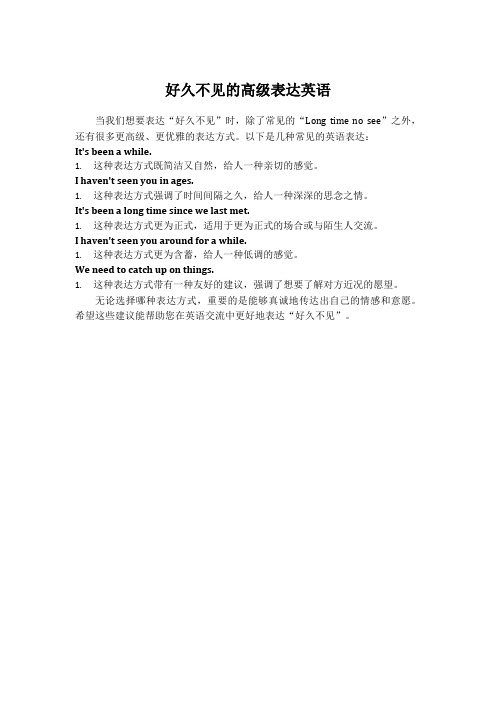
好久不见的高级表达英语
当我们想要表达“好久不见”时,除了常见的“Long time no see”之外,还有很多更高级、更优雅的表达方式。
以下是几种常见的英语表达:
It's been a while.
1.这种表达方式既简洁又自然,给人一种亲切的感觉。
I haven't seen you in ages.
1.这种表达方式强调了时间间隔之久,给人一种深深的思念之情。
It's been a long time since we last met.
1.这种表达方式更为正式,适用于更为正式的场合或与陌生人交流。
I haven't seen you around for a while.
1.这种表达方式更为含蓄,给人一种低调的感觉。
We need to catch up on things.
1.这种表达方式带有一种友好的建议,强调了想要了解对方近况的愿望。
无论选择哪种表达方式,重要的是能够真诚地传达出自己的情感和意愿。
希望这些建议能帮助您在英语交流中更好地表达“好久不见”。
英语中表达级别的词汇

英语中表达级别的词汇全文共四篇示例,供读者参考第一篇示例:英语中有很多词汇可以用来表达不同的级别或程度。
这些词汇可以帮助我们更准确地描述事物或情况的重要性、程度或强度。
在英语中,我们可以使用形容词、副词以及一些特定的短语来表达级别。
下面将介绍一些常用的表达级别的词汇及其用法。
1. Very(非常)Very是一个最常用的表达级别的词汇之一,可以用来表示某事物或情况的程度非常高。
比如:- This movie is very interesting.(这部电影非常有趣。
)- She is very beautiful.(她非常漂亮。
)2. Extremely(极其)Extremely比very更强烈,表示某事物或情况的程度超出寻常。
比如:- The weather is extremely hot today.(今天的天气极其炎热。
)- He was extremely excited when he heard the news.(他听到消息时极度兴奋。
)以上是一些常用的表达级别的词汇及其用法。
在日常生活中,我们可以根据需要选择合适的词汇来描述事物或情况的程度,以使我们的表达更加准确和生动。
希望以上内容对你有所帮助,谢谢!第二篇示例:在英语中,有许多词汇用来表达不同的级别或程度。
这些词汇可以帮助我们更清晰地表达自己的想法和情感。
在本文中,我们将介绍一些常见的表达级别的词汇,以帮助你丰富自己的词汇量。
一、表达积极程度的词汇2. Absolutely(绝对)例如:I absolutely love this new book.3. Fantastic(棒极了)例如:The performance was fantastic last night.以上是一些常见的表达级别的英语词汇,希望可以帮助你更准确地表达自己的感受和看法。
记得在日常生活中多多使用这些词汇,提高自己的英语水平。
祝你学习进步!第三篇示例:在英语语言中,我们经常会使用一些级别词汇来描述事物的程度、大小、重要性或紧急性等。
favourite 口语 favour
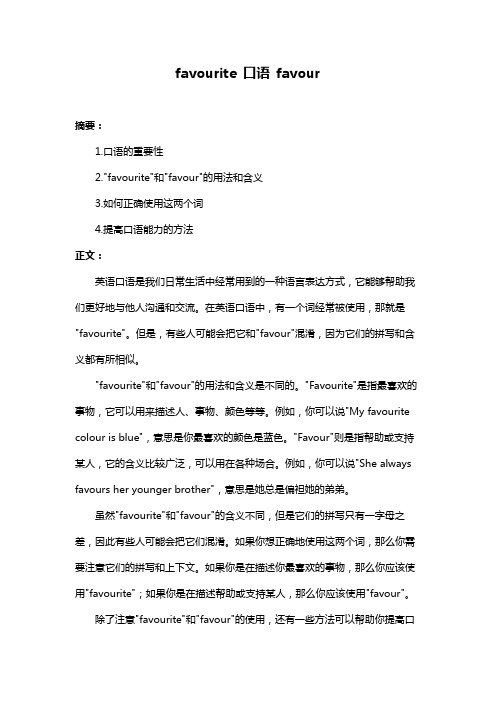
favourite 口语favour摘要:1.口语的重要性2."favourite"和"favour"的用法和含义3.如何正确使用这两个词4.提高口语能力的方法正文:英语口语是我们日常生活中经常用到的一种语言表达方式,它能够帮助我们更好地与他人沟通和交流。
在英语口语中,有一个词经常被使用,那就是"favourite"。
但是,有些人可能会把它和"favour"混淆,因为它们的拼写和含义都有所相似。
"favourite"和"favour"的用法和含义是不同的。
"Favourite"是指最喜欢的事物,它可以用来描述人、事物、颜色等等。
例如,你可以说"My favourite colour is blue",意思是你最喜欢的颜色是蓝色。
"Favour"则是指帮助或支持某人,它的含义比较广泛,可以用在各种场合。
例如,你可以说"She always favours her younger brother",意思是她总是偏袒她的弟弟。
虽然"favourite"和"favour"的含义不同,但是它们的拼写只有一字母之差,因此有些人可能会把它们混淆。
如果你想正确地使用这两个词,那么你需要注意它们的拼写和上下文。
如果你是在描述你最喜欢的事物,那么你应该使用"favourite";如果你是在描述帮助或支持某人,那么你应该使用"favour"。
除了注意"favourite"和"favour"的使用,还有一些方法可以帮助你提高口语能力。
例如,你可以多听多说,这样可以帮助你更好地理解英语口语的语音和语调;你也可以多看英语电影或电视节目,这样可以帮助你更好地理解英语口语的用法和含义;最后,你可以多练习,这样可以帮助你更好地掌握英语口语的技巧和方法。
- 1、下载文档前请自行甄别文档内容的完整性,平台不提供额外的编辑、内容补充、找答案等附加服务。
- 2、"仅部分预览"的文档,不可在线预览部分如存在完整性等问题,可反馈申请退款(可完整预览的文档不适用该条件!)。
- 3、如文档侵犯您的权益,请联系客服反馈,我们会尽快为您处理(人工客服工作时间:9:00-18:30)。
当别人在你旁边罗嗦个没完,你烦透了,说“You are so boring “.(你真烦!)。
“Shut up !”(闭嘴!)自然没错,可人家受得了吗?不如来一句“Oh, come on .Give me a break !” (帮帮忙,让我歇歇吧!)这多地道、多幽默。
要想说人“气色好”。
“You look fine !”当然不错,可如果你说”You’re in the pink !”就妙得多了,实际上,在英语口语中,表示颜色的词用起来非常形象生动。
“他精力充沛”美国人说:“He is bouncy.”而不说“He is energetic ”,牢记一些日常对话中的活句式是你一把必备的钥匙。
如:久仰,“I get mind of you “.比”I heard a lot about you.”轻松得多。
代问他人好当然能用”Please remember me to your sister .”或”Please give my best wishes to your father ”不过,若是很好的朋友,何不说,“Please give my love to Jim。
”在中国可不能随便说“我想你”,然而,当和西方人分手时说“I will miss you .”要比说“Good-bye”或“See you soon”有趣得多,不妨一试。
有人开会迟到了,你若对他说“You are late .”,听起来象是废话,若说“Did you get lost ?”,则更能让他歉然,可别说成“Get lost!”那可是让人滚蛋的意思。
别人征求你的意见,问能否开窗户等,你要说“You can do that .”就有点土了,用一句“Do you have the time? ”实际上,问他人的姓名,地址都可以这么用:“May I have you name?“要比”What’s your name ? ”礼貌得多,不过警察例外。
别人问你不愿公开的问题,切勿用“It’s my secret ,Don’t ask such a personal question .”回答,一来显得你没有个性,二来也让对方尴尬。
你可以说“I would rather not say .”(还是别说了吧!)。
有时候,你想说什么,可说是想不起来,你可以说“Well …”“Let me see”“Just a moment ”或“It’s on the tip of my tongue.”等,想比之下,最后一个句型是最地道的。
交谈时,你可能会转换话题,不要只说“By the way ”,实际上,“To change the subject”“Before I forget”“While I remember”“Mind you ”都是既地道有受欢迎的表达。
遇到你不懂的问题时可别不懂装懂,“I know”可能是中国人用得最多,而美国人最不能接受的一句话。
当一美国教师向你解释某个问题时,你如果连说两遍“I know”可能是中国人用得最多,而美国人最不能接受的一句话。
当一美国教师向你解释某个问题时,你如果连说两遍“I know”,我敢保证,他不会再跟你说什么了。
用“I know ”或“I got it ”就顺耳得多,要是不懂就说“I’m not clear about it .”不过如果你会说“It’s past my understanding”或“It’s beyond me .”你的教师定会惊讶不已的。
要想将地道习语熟练地运用于口语,下面内容,不可不读:☆ a black sheep 败家子绵羊一般为白色,一旦成了黑色的绵羊,一定是个“败类”。
Eric is a black sheep ,splashing one million dollars in a few years .艾瑞克是个败家子,几年就挥霍了一百万美金。
☆ A rough diamond 内秀外粗的人Rough diamond 指“没加工的钻石”,用来指内秀外粗的人,真是妙语!{脱口说}The guy is really a rough diamond , and he can get everything right ,although he is a little bit careless .这家伙真的是个外粗内秀的人,他什么都能搞定,虽然他有点大大咧咧的。
☆ Be level-headed (calm and relaxed) 头脑冷静的人可别以为 level-headed 是“小平头”,“平头”的英语说法是“crew cut”,他留了个平头——He wears his hair in a crew cut .{脱口说}My boss ,John Smith ,is the most level –headed man I’ve ever known .我的老板约翰.史密斯是我见过的头脑最冷静的人。
☆ A greaseball (greasy guy ) 油腔滑调的人,“老油条”Grease 油脂的意思,greaseball 的意思是涂满油脂的球,专指那些油腔滑调的人,这类人近似于我们常说的“嘴太贫”的人。
{脱口说}Mary’s boyfriend is such a greaseball , I don’t know why she is so crazy about him . 玛丽的男友是个油腔滑调的家伙,我不明白为什么她如此地迷恋他。
☆ Weigh on one’s mind 心事重重{脱口说}Do you know what has happened to her recently? She seems to have something that weighs heavily on her mind these days你知道她最近发生了什么事吗?她看起来心事很重。
☆ Be green-eyed (be jealousy) 嫉妒的“红眼病”源自莎士比亚名剧《奥赛罗》第3幕第3场中的台词“O! be ware , my lord ,of jealousy;/It’s the green-eyed monster……“中国人嫉妒时,是“红眼病”,英美国家的人则“绿了眼”,有意思。
在美国,有时直接用green 表示嫉妒。
When I got the well-paid job in a foreign company , my friends were somewhat green with envy .当我在一家外企找了份收入丰厚的工作时,我的朋友都有点嫉妒我。
☆ Your doggy looks quite lovely , doesn’t he ?(你的狗宝宝看上去真可爱!)☆ Excuse me ,but your blue coat is pretty beautiful ,Where did you buy it ? (打扰你了。
你的蓝上衣真是漂亮,哪儿买的?)在同外国人士交往过程中,你要注意别人的外表是否有了大的变化或添了新的装饰,如新发型、新衣服、首饰等。
然后加以适当的赞美,但无须过分,否则就有虚情假意之嫌.即便是对方外观没有大的改观,但比平时略显精神,你也可以说,☆“Ben, you look very good today.”或Ben ,you’re looking energetic these days .”(本,你近来显得活力十足。
)在美国,对别人新添置的物品都要习惯地加以赞美,如☆“Hey, I’m crazy about your new bicycle.”(嘿,我真喜欢你的新自行车。
)☆“Your new dress has brilliant color!”(你的新衣服颜色真鲜艳!)如果被邀请去参观朋友的住宅、办公室或公司,对其加以赞美就是比不可少的了。
☆“I can’t imagine you have such a splendid house !”(真不敢相信你竟有这么豪华的房子。
)☆“How nice your office looks “(你的办公室看上去不错。
)要知道,没人不爱听这些。
不过在吃饭时,外国人对你菜肴的赞美往往只是礼貌,即使他们吃不惯,他们也会说“The dish is delicious ”可不要拿出中国人的豪爽,没完没了给他夹菜,浪费了不说,还常常弄得对方难堪。
表达赞美时需要注意以下情况:1、赞美一两句即可,当别人表示感谢之后就可打住,或进入别的话题。
2、若别人向你展示新买的衣服等,即便你对它感觉不如意,也要尽量发现你感兴趣的地方,如颜色、样式等加以赞美。
3、中国人很少当面夸赞别人的妻子长得如何漂亮,而在西方文化中,对别人妻子的赞美是活跃气氛并且很受欢迎的。
不过,赞美之后,你的眼睛久久不能从那女士的脸上挪开,可就另当别论了。
4、赞美别人的首饰或衣服之后不要画蛇添足,问她一句,“It must be very expensive. How much is it?”(这一定很贵吧。
多少钱啊?)5、无论别人怎样赞美你,你只要一句“Thanks a lot.”就足以达到交流的效果,无须中国式的谦虚,“No, No”,会让赞美你的人莫明其妙,甚至认为你怀疑他的审美观有问题。
6、美国老师上课时大多慈悲为怀,只要学生开口,无论怎样信口开河或者牛头不对马嘴,老师都会说“Good job!”;“Very nice!”;“Ok, you have a creative answer”;“What an original opinion!”。
这既能鼓励学生,又能激发学生参与的积极性。
这可是中国老师不妨学学的地方。
7、在英美国家的各种聚会上,女士们常夸赞自己的丈夫有能力,夸赞自己的孩子如何聪明可爱;男士们也常夸赞自己的妻子温柔可人,夸赞自己的老板如何地重用自己,这既能活跃气氛,又能尽显自己人性美的一部分。
若有机会你参加外国人的ball(舞会),你也不妨收起你的谦虚,将你的赞美适时适度地表达出来。
break one's heart由break 和beart构成的词很多,如:hearbreak(极度伤心); hearbreaking(使心碎的),heat-broken(极度伤心的) ,大家可能注意到都是和"伤心"有关,break one's heat 就是指伤透某人的心。
实战运用:A:You look so sad ! what happenedB: I broke up with my girl friend yesterdayA: Did you ? I had the same experience ,It almost broke my heart .B : But luckily you're all right now .brush to one sidebrush的意思是"推、拂"从字面上看,该习语的意思是:"把……拂到一边去,",由此引申为"不屑一顾"实战运用:A : Helen's become so proud since she married that rich man .B : I once talked with her ,but she brushed all my suggestion to one side .A : She'll ask for it .B: Sure .butt inbutt 有"冲、撞、冒冒失失地开"的意思。
